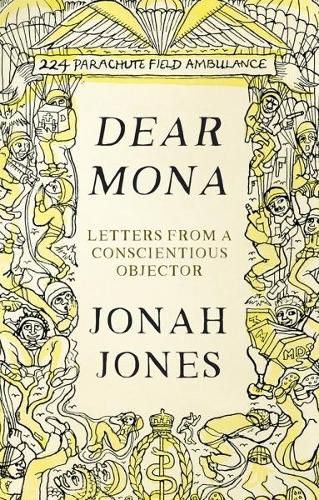Readings Newsletter
Become a Readings Member to make your shopping experience even easier.
Sign in or sign up for free!
You’re not far away from qualifying for FREE standard shipping within Australia
You’ve qualified for FREE standard shipping within Australia
The cart is loading…






Dear Mona, Letters from a Conscientious Objector is a book of many parts. These are the letters of 20 year old Len Jones to his mentor and would-be partner Mona Lovell, who worked with him in Newcastle library service, and was educating in the arts and as a Quaker. They begin with his principled stand as a conscientious objector and describe life in forestry and other occupations during the Second World War. Here he worked with other like-minded people - including future Member of Parliament Bill Hamilton, and the poet James Kirkup - who also helped to develop his thinking and his character. It was on a forestry posting in North Yorkshire that Jones first experimented with painting and engraving, which he would refine in the course of the war and which would subsequently become his living. These letters are a remarkable first-hand account of how Jones’ character evolved. Like a number of COs he eventually took a more active role in the fight against fascism by becoming a non-arms bearing medic. In this role he was parachuted into northern Europe and took part in the Ardennes and German campaigns, and in the opening of the Dachau concentration camp. After the war he was posted to Palestine, where he observed the issues surrounding the establishment of Israel, but was also able to hone his artistic skills for the benefit of his regiment. It was in Haifa that, much to Mona’s dismay, he met and married Judith Grossman, with whom he returned to Britain to set up as an artist, now known as Jonah Jones. In Dear Mona, Jones records in his own words not just the story of his early life as it happened, as he changed from gauche Len Jones to artist Jonah Jones, but also the story of the Home Front, of conscientious objection, of the European campaign following D Day and of the tensions in Palestine, which resonate still today. It is a remarkable, immediate account: personal, intimate and yet also history, played out before his eyes.
$9.00 standard shipping within Australia
FREE standard shipping within Australia for orders over $100.00
Express & International shipping calculated at checkout
Dear Mona, Letters from a Conscientious Objector is a book of many parts. These are the letters of 20 year old Len Jones to his mentor and would-be partner Mona Lovell, who worked with him in Newcastle library service, and was educating in the arts and as a Quaker. They begin with his principled stand as a conscientious objector and describe life in forestry and other occupations during the Second World War. Here he worked with other like-minded people - including future Member of Parliament Bill Hamilton, and the poet James Kirkup - who also helped to develop his thinking and his character. It was on a forestry posting in North Yorkshire that Jones first experimented with painting and engraving, which he would refine in the course of the war and which would subsequently become his living. These letters are a remarkable first-hand account of how Jones’ character evolved. Like a number of COs he eventually took a more active role in the fight against fascism by becoming a non-arms bearing medic. In this role he was parachuted into northern Europe and took part in the Ardennes and German campaigns, and in the opening of the Dachau concentration camp. After the war he was posted to Palestine, where he observed the issues surrounding the establishment of Israel, but was also able to hone his artistic skills for the benefit of his regiment. It was in Haifa that, much to Mona’s dismay, he met and married Judith Grossman, with whom he returned to Britain to set up as an artist, now known as Jonah Jones. In Dear Mona, Jones records in his own words not just the story of his early life as it happened, as he changed from gauche Len Jones to artist Jonah Jones, but also the story of the Home Front, of conscientious objection, of the European campaign following D Day and of the tensions in Palestine, which resonate still today. It is a remarkable, immediate account: personal, intimate and yet also history, played out before his eyes.